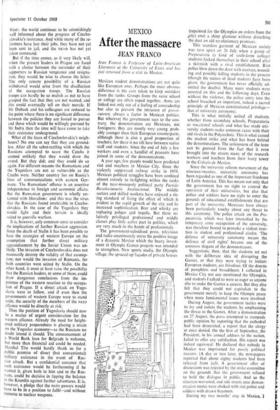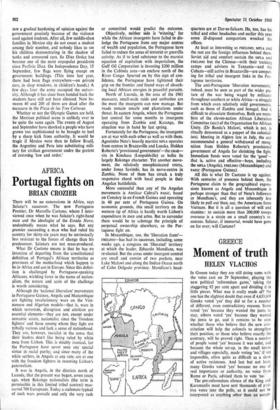After the massacre
MEXICO JEAN FRANCO
Jean Franco is Frofessor of Latin-American Literature at the University of Essex and has just returned from a visit to Mexico.
Mexican student demonstrations are not quite like European ones. Perhaps the most obvious difference is the care taken to keep outsiders from the ranks. Groups from the same school or college are often roped together. Arms are linked not only out of a feeling of comradeship but also to prevent the intrusion of provo- cateurs, always a factor in Mexican politics. But whatever the government says to the con- trary, the demonstrators are Mexicans, not foreigners; they are mostly very young, prob- ably younger than their European counterparts, although there is also a good proportion of teachers, for there is no rift here between senior staff and students. Since the end of July a few workers and even a handful of peasants have joined in some of the demonstrations.
A year ago, few people would have predicted riot and mayhem in Mexico City. Since the violently suppressed railway strike in 1959, Mexican political struggles have been confined almost entirely to in-fighting within the ranks of the near-monopoly political party Partido Revohtcianario Institutional. The middle sectors and skilled workers have enjoyed a ris- ing standard of living the effect of which is evident in the rapid growth of the city and its increased sophistication. Beer and whisky are replacing pulque 4,nd tequila. But these re- latively privileged professional and middle classes play little active part in politics, which are very much in the hands of professionals.
The government-subsidised press, television and radio unanimously stress the positive image of a dynamic Mexico which the heavy invest- ment in Olympic Games projects was intended to strengthen. New sports stadia, the Olympic village, the spruced-up facades of private houses (repainted for the Olympics on orders from the pity) emit a shiny glamour without disturbing the dust on old revolutionary promises.
This seamless garment of Mexican society was torn apart on 26 July when a group of
Preparatoria (a kind of sixth-form college)
students locked themselves in their school after a skirmish with a rival establishment. Riot police blew down the door with mortars, wound- ing and possibly killing students in the process (though the names of dead students have been given, the government has never officially ad- mitted the deaths). Many more students were arrested on this and the following days. Even without the violence, the police entry into the school breached an important, indeed a sacred principle of Mexican constitutional privilege— that of university autonomy.
This is what initially united all students, whether from secondary schools, Preparatoria or vocational schools and what has made uni- versity students make common cause with their old rivals in the Polytechnic. This is what caused the student strike and what has been behind the demonstrations. The seriousness of the issue can be guessed from the fact that it even brought into the streets many of the research workers and teachers from their ivory tower in the Colegio de Mexico.
Since the university reform movement of the nineteen-twenties, university autonomy has been regarded as one of the important freedoms of Latin AMerica. This has meant not only that the government has no right to control the operation of their universities, but also that police and soldiers have no right to enter the grounds of educational establishments that are part of the university. Mexicans have always been particularly touchy about any threat to this autonomy. The police attack on the Pre- paratoria, which was later intensified by the temporary army occupation of the university, was therefore bound to provoke a violent reac- tion in student and professional circles. 'The defence of university autonomy means the defence of civil rights' became one of the common slogans of the demonstrators.
Suggestions, then, that the students set out with the deliberate idea of disrupting the Games, or that they were trying to imitate European students, arc frivolous. Of the dozens of pamphlets and broadsheets I collected in Mexico City not one mentioned the Olympics, and students I talked to were as eager as anyone else to make the Games a success. But they also felt that they could not capitulate to the government merely to keep the Olympic peace when more fundamental issues were involved.
During August, the government tactics were to try and isolate the students by emphasising the threat to the Games. After a demonstration on 27 August, the press attempted to stampede public opinion by reporting that the cathedral had been desecrated, a report that the clergy at once denied. On the first of September, the President, in his annual address to the nation, failed to offer any satisfaction. His report was indeed equivocal. He declared that nobody in Mexico was imprisoned for purely political reasons. (A day or two later, the newspapers reported that about eighty students had been released from jail). A government offer of discussions was rejected by the strike committee on the grounds that the government refused to hold the dialogue in public. And so the situation worsened, and side streets near demon- stration routes were choked with riot police and soldiers with drawn bayonets.
During my two months' stay in Mexico, I
saw a gradual hardening of opinion against the government precisely because of the violence used against students. After all, few middle-class families in Mexico city do not count a student among their number, and nobody likes to see his children demonstrating in the shadow of tanks and armoured cars. So Diaz Ordaz has become one of the most unpopular presidents since Porfirio Diaz. On Independence Day, 15 September, few flags were flying except on government buildings. (This time last year, there had been flags everywhere—on private cars, in shop windows, in children's hands.) A few days later the army occupied the univer- sity. Although it has since been handed back the students have still not been silenced. Now be- tween 40 and 200 of them are dead after the massacre in the Plaza de las Tres Cu!turas.
Whether or not the Olympic Games are held, the Mexican political scene is unlikely ever to be quite the same again. The events of August and September have shocked a people who have grown too sophisticated to be brought to heel
• by a sharp kick from authority. It would be tragic if Mexico were then to follow Brazil, the Argentine and Peru into substituting mili- tary for civilian government under the pretext of restoring 'law and order.'







































 Previous page
Previous page